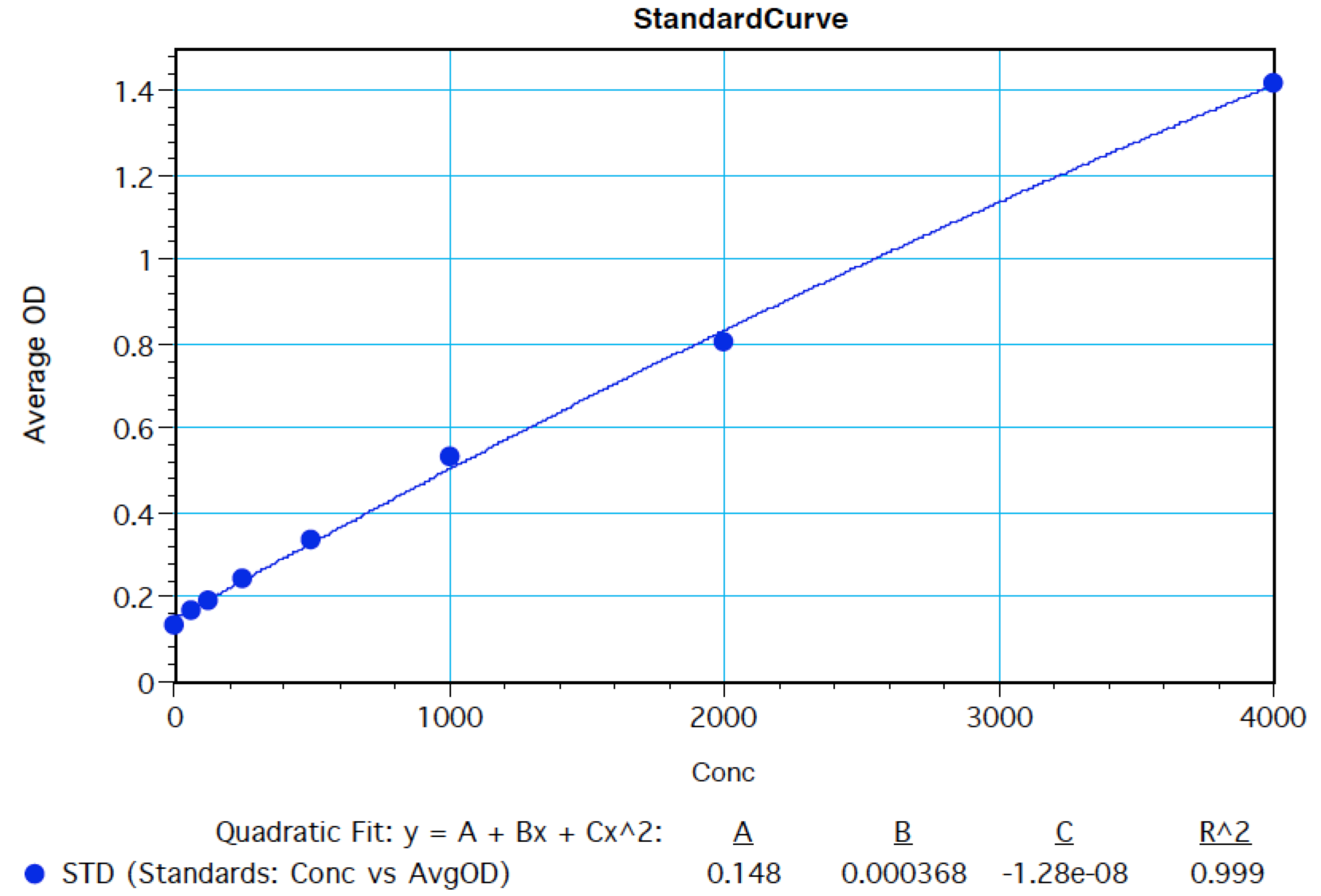Canine IFN-gamma Quantikine ELISA Kit Summary
Product Summary
Precision
Cell Culture Supernates, Serum, EDTA Plasma, Heparin Plasma
| Intra-Assay Precision | Inter-Assay Precision | |||||
|---|---|---|---|---|---|---|
| Sample | 1 | 2 | 3 | 1 | 2 | 3 |
| n | 20 | 20 | 20 | 20 | 20 | 20 |
| Mean (pg/mL) | 111 | 459 | 1234 | 119 | 457 | 1315 |
| Standard Deviation | 10.1 | 35.1 | 92.4 | 10.1 | 21.5 | 64.8 |
| CV% | 9.1 | 7.6 | 7.5 | 8.5 | 4.7 | 4.9 |
Recovery
The recovery of canine IFN-gamma spiked to levels throughout the range of the assay in various matrices was evaluated.
| Sample Type | Average % Recovery | Range % |
|---|---|---|
| Cell Culture Supernates (n=4) | 103 | 92-111 |
| EDTA Plasma (n=4) | 96 | 86-102 |
| Heparin Plasma (n=4) | 98 | 93-106 |
| Serum (n=4) | 96 | 83-107 |
Linearity
Scientific Data
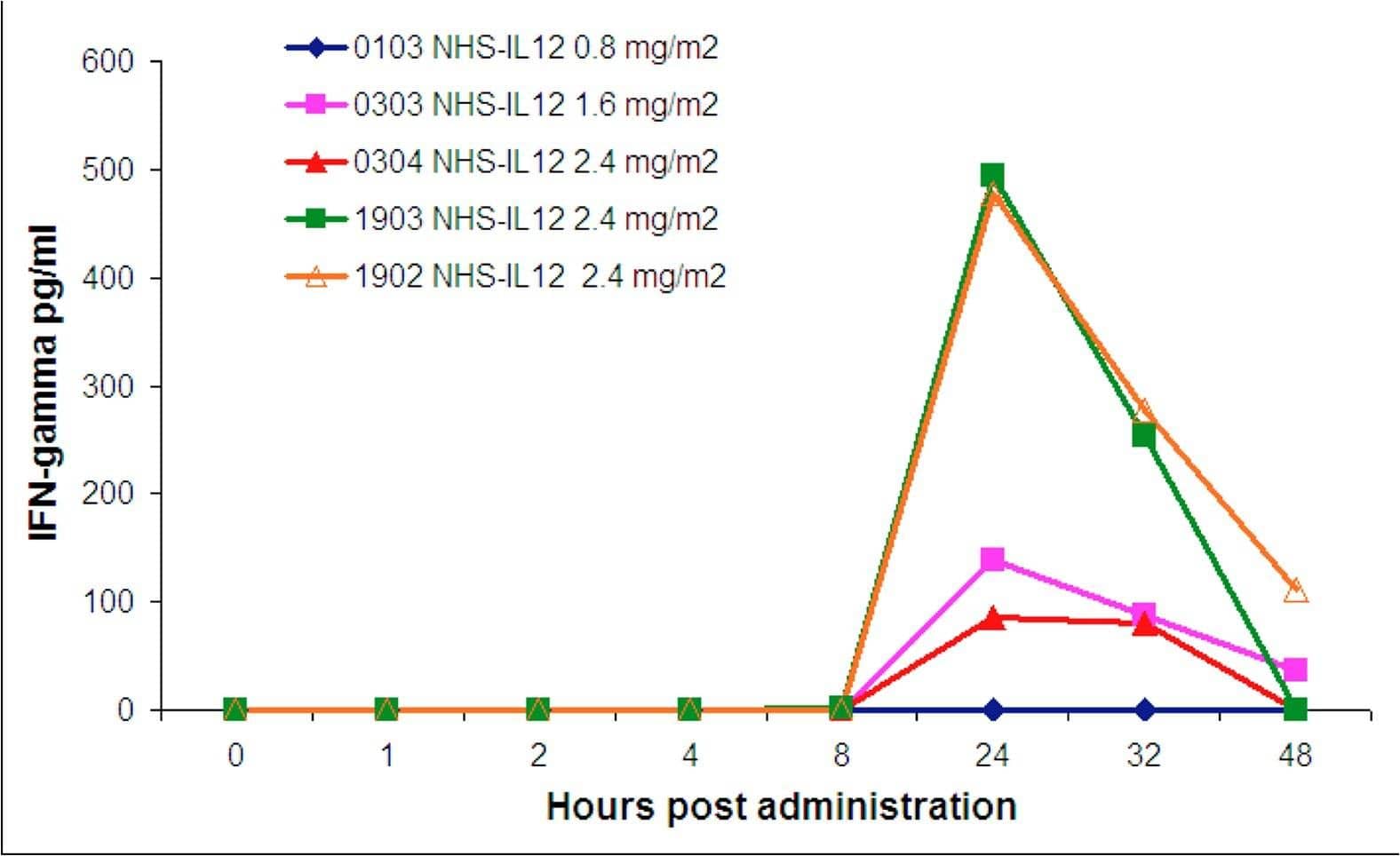 View Larger
View Larger
Detection of Canine IFN-gamma by ELISA Serum IFN-gamma induction was associated with NHS-IL12 dose and the observation of adverse events.IFN-gamma levels were measured using ELISA techniques. Induction of IFN-gamma was detectable in dogs treated with NHS-IL12 at a dose of 1.6 mg/m2 or higher. IFN-gamma levels spiked sharply at 24 hours post-treatment and returned to undetectable levels by 48 hours. Elevated serum IFN-gamma (> 100 pg/ml) was associated with increased risk for toxicity. However the highest level of IFN-gamma induction was not directly linked to the most severe (Grade 4 or 5) adverse events. Image collected and cropped by CiteAb from the following open publication (https://pubmed.ncbi.nlm.nih.gov/26091536), licensed under a CC-BY license. Not internally tested by R&D Systems.
Product Datasheets
Preparation and Storage
Background: IFN-gamma
IFN-gamma (Interferon-gamma) is the prototype proinflammatory cytokine and is produced by a variety of immune cells under inflammatory conditions, notably by T cells and NK cells. It plays a key role in host defense by promoting the development and activation of Th1 cells, chemoattraction and activation of monocytes and macrophages, upregulation of antigen presentation molecules, and immunoglobulin class switching in B cells. It also exhibits antiviral, antiproliferative, and apoptotic effects. In addition, IFN-gamma functions as an anti-inflammatory mediator by promoting the development of regulatory T cells and inhibiting Th17 cell differentiation. IFN-gamma dimers signal through a receptor complex of two IFN-gamma R1 and two IFN-gamma R2 subunits.
Assay Procedure
Refer to the product- Prepare all reagents, standard dilutions, and samples as directed in the product insert.
- Remove excess microplate strips from the plate frame, return them to the foil pouch containing the desiccant pack, and reseal.
- Add 50 µL of Assay Diluent to each well.
- Add 50 µL of Standard, Control, or sample to each well. Tap the plate gently for 1 minute. Cover with a plate sealer, and incubate at room temperature for 2 hours.
- Aspirate each well and wash, repeating the process 4 times for a total of 5 washes.
- Add 100 µL of Conjugate to each well. Cover with a new plate sealer, and incubate at room temperature for 1 hour.
- Aspirate and wash 5 times.
- Add 100 µL Streptavidin-HRP to each well. Cover with a new plate sealer, and incubate at room temperature for 30 minutes.
- Aspirate and wash 5 times.
- Add 100 µL Substrate Solution to each well. Incubate at room temperature for 30 minutes. PROTECT FROM LIGHT.
- Add 100 µL of Stop Solution to each well. Gently tap the plate to ensure thorough mixing. Read at 450 nm within 30 minutes. Set wavelength correction to 540 nm or 570 nm.
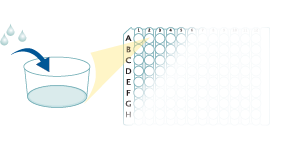



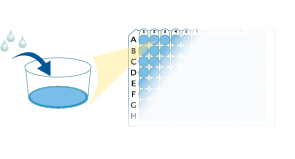
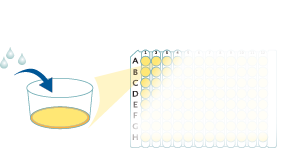
Citations for Canine IFN-gamma Quantikine ELISA Kit
R&D Systems personnel manually curate a database that contains references using R&D Systems products. The data collected includes not only links to publications in PubMed, but also provides information about sample types, species, and experimental conditions.
12
Citations: Showing 1 - 10
Filter your results:
Filter by:
-
Mycobacterium intracellulare induces a Th17 immune response via M1-like macrophage polarization in canine peripheral blood mononuclear cells
Authors: S Kim, YS Hyun, HT Park, MK Shin, HS Yoo
Scientific Reports, 2022-07-12;12(1):11818.
Species: Canine
Sample Types: Cell Culture Supernates
-
Development of canine PD-1/PD-L1 specific monoclonal antibodies and amplification of canine T cell function
Authors: JW Choi, SS Withers, H Chang, JA Spanier, VL De La Trin, H Panesar, BT Fife, R Sciammas, EE Sparger, PF Moore, MS Kent, RB Rebhun, SJ McSorley
PLoS ONE, 2020-07-02;15(7):e0235518.
Species: Canine
Sample Types: Cell Culture Supernates
-
Oat beta-glucan as a dietary supplement for dogs
Authors: LG Ferreira, M Endrighi, KG Lisenko, MRD de Oliveir, MR Damasceno, JA Claudino, PG Gutierres, AP Peconick, FMOB Saad, MG Zangeronim
PLoS ONE, 2018-07-31;13(7):e0201133.
Species: Canine
Sample Types: Plasma
-
Lymphocytic, cytokine and transcriptomic profiles in peripheral blood of dogs with atopic dermatitis
BMC Vet Res, 2016-08-23;12(1):174.
Species: Canine
Sample Types: Plasma
-
Defining the Pharmacodynamic Profile and Therapeutic Index of NHS-IL12 Immunocytokine in Dogs with Malignant Melanoma.
Authors: Paoloni M, Mazcko C, Selting K, Lana S, Barber L, Phillips J, Skorupski K, Vail D, Wilson H, Biller B, Avery A, Kiupel M, LeBlanc A, Bernhardt A, Brunkhorst B, Tighe R, Khanna C
PLoS ONE, 2015-06-19;10(6):e0129954.
Species: Canine
Sample Types: Serum
-
Use of a recombinant cysteine proteinase from Leishmania (Leishmania) infantum chagasi for the Immunotherapy of canine visceral Leishmaniasis.
Authors: Ferreira J, Silva L, Longo-Maugeri I, Katz S, Barbieri C
PLoS Negl Trop Dis, 2014-03-13;8(3):e2729.
Species: Canine
Sample Types: Serum
-
Identification of myeloid derived suppressor cells in dogs with naturally occurring cancer.
Authors: Goulart MR, Pluhar GE, Ohlfest JR
PLoS ONE, 2012-03-13;7(3):e33274.
Species: Canine
Sample Types: Cell Culture Supernates
-
Human Flt3L generates dendritic cells from canine peripheral blood precursors: implications for a dog glioma clinical trial.
Authors: Xiong W, Candolfi M, Liu C
PLoS ONE, 2010-06-11;5(6):e11074.
Species: Canine
Sample Types: Cell Culture Supernates
-
Injection of a recombinant AAV serotype 2 into canine skeletal muscles evokes strong immune responses against transgene products.
Authors: Yuasa K, Yoshimura M, Urasawa N, Ohshima S, Howell JM, Nakamura A, Hijikata T, Miyagoe-Suzuki Y, Takeda S
Gene Ther., 2007-06-21;14(17):1249-60.
Species: Canine
Sample Types: Cell Culture Supernates
-
Prime-boost immunization with DNA followed by a recombinant vaccinia virus expressing P50 induced protective immunity against Babesia gibsoni infection in dogs.
Authors: Fukumoto S, Tamaki Y, Okamura M, Bannai H, Yokoyama N, Suzuki T, Igarashi I, Suzuki H, Xuan X
Vaccine, 2006-10-10;25(7):1334-41.
Species: Canine
Sample Types: Serum
-
A functional comparison of canine and murine bone marrow derived cultured mast cells.
Authors: Lin TY, London CA
Vet. Immunol. Immunopathol., 2006-10-06;114(3):320-34.
Species: Canine
Sample Types: Cell Culture Supernates
-
Effect of ovarian hormones on periodical changes in immune resistance associated with estrous cycle in the beagle bitch.
Authors: Sugiura K, Nishikawa M, Ishiguro K, Tajima T, Inaba M, Torii R, Hatoya S, Wijewardana V, Kumagai D, Tamada H, Sawada T, Ikehara S, Inaba T
Immunobiology, 2004-01-01;209(8):619-27.
Species: Canine
Sample Types: Cell Culture Supernates
FAQs
-
Assay Diluent RD1-63 contains visible precipitate. Is this acceptable to use?
A small amount of precipitate is expected and acceptable in Assay Diluent RD1-63. Variability has been observed between vials and diluent lots. It may not fully resolubilize but this will not impact assay performance. It is not recommended to filter the precipitate.
Reviews for Canine IFN-gamma Quantikine ELISA Kit
Average Rating: 5 (Based on 5 Reviews)
Have you used Canine IFN-gamma Quantikine ELISA Kit?
Submit a review and receive an Amazon gift card.
$25/€18/£15/$25CAN/¥75 Yuan/¥2500 Yen for a review with an image
$10/€7/£6/$10 CAD/¥70 Yuan/¥1110 Yen for a review without an image
Filter by:
The standards in this kit work very well - over 0.99 R squared every time I use it. Great assay. Would recommend to a colleague. Consistent and reliable.


